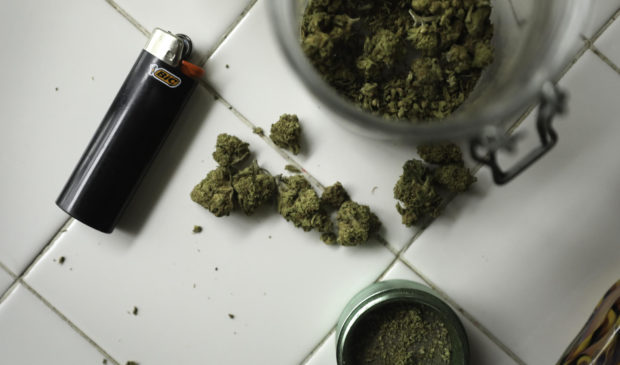Austin will not pay to test for marijuana, effectively decriminalizing small amounts of pot
Friday, January 24, 2020 by
Audrey McGlinchy, KUT As law enforcement agencies in Texas figure out how to test suspected marijuana following the legalization of hemp in the state, the Austin City Council responded Thursday with its fix: a measure that effectively decriminalizes small amounts of pot.
“It’s the right thing for criminal justice reform, from a common-sense perspective, and it’s the right thing for racial equity,” Council Member Greg Casar, who co-sponsored the measure, said after the vote.
In a 9-0 vote, Council members asked police officers to stop citing and arresting people for low-level marijuana cases when they believe the county won’t be able to prosecute. Council members also voted not to spend city money on testing except in high-priority felonies, such as violent or trafficking offenses, leaving courts to figure out other means of distinguishing marijuana from hemp.
It’s still up to the police department’s discretion, however. In a tweet Wednesday, Austin Police Chief Brian Manley said, “The City Council does not have the authority to direct APD not to enforce a state law.”
Mayor Steve Adler and Jimmy Flannigan were not present for Thursday’s vote, which came after roughly an hour of public testimony. Only the president of the police union spoke against the measure.
In June, a new state law legalizing hemp went into effect. Texas House Bill 1325 distinguished hemp from marijuana, stating that the latter has more than 0.3% of THC, the ingredient that gets people high. Prosecutors across the state began saying they would not pursue cases without testing whether evidence was legal hemp or illegal marijuana.
That included Travis County prosecutors, who have been dismissing marijuana cases brought to them without testing. District Attorney Margaret Moore has said the county can’t afford to pay for testing; as a result, her office, which handles felonies, has dismissed 181 cases.
County Attorney David Escamilla, who prosecutes misdemeanors, said in mid-July his office had dismissed 61 cases of marijuana possession.
In the meantime, Austin police have continued citing people, who are then turned away when they show up to court.
But other law enforcement agencies have started paying for testing. Moore said her office has been able to pursue three cases out of Cedar Park because the police department there paid for a private lab to test evidence. Others have gone the route of Austin; the Round Rock Police Department stopped citing and arresting people for low-level marijuana cases last summer.
Texas leaders, including Gov. Greg Abbott, sent a letter to county prosecutors across the state a month after the new hemp bill became law, reminding them that weed remained illegal.
“This regulation of hemp did not abolish or reduce punishment for the possession of marijuana, which remains illegal under state law,” they wrote. The governor did not respond to a request for comment on the vote in Austin.
Some Council members hailed the measure as a way to save money, referencing the state’s new limit on how much in property tax revenue cities can collect year over year. Others said it could stanch the flow of people getting caught up in the criminal justice system.
“I have frequent occasions to find myself in really privileged, moneyed, predominantly white spaces in the city and constantly see these substances used with impunity,” Anthony Watkins, a musician who goes by the name Mobley, said Thursday. “It’s difficult to describe how gut-wrenching and how Kafkaesque it is to go from those spaces back to my neighborhood where I interact with people … who’ve come into contact with the state and criminal justice system as a result of engaging in the same activities.”
According to Austin Police Department data, citations for marijuana possession disproportionately affect black people. Thirty-eight percent of people APD cited for marijuana possession in 2019 were black in a city where black people make up roughly 8% of the population.
City Council asked to hear back from the city manager about changes to police procedures and policy in response to the ordinance by May 1. Council also asked for a written report on how the ordinance has been applied by Jan. 31, 2021.
This story was produced as part of the Austin Monitor’s reporting partnership with KUT. Photo by Julia Reihs/KUT.
The Austin Monitor’s work is made possible by donations from the community. Though our reporting covers donors from time to time, we are careful to keep business and editorial efforts separate while maintaining transparency. A complete list of donors is available here, and our code of ethics is explained here.
You're a community leader
And we’re honored you look to us for serious, in-depth news. You know a strong community needs local and dedicated watchdog reporting. We’re here for you and that won’t change. Now will you take the powerful next step and support our nonprofit news organization?









